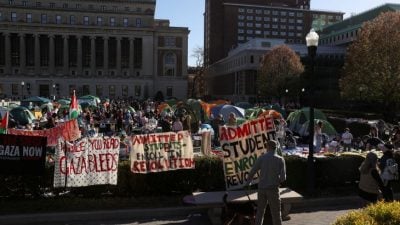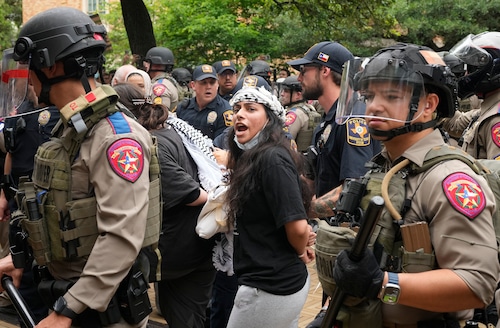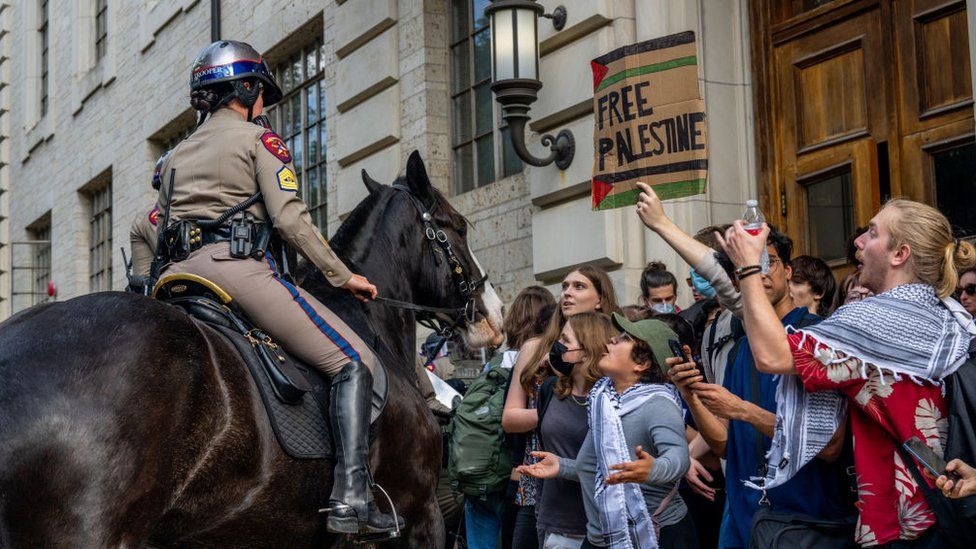US University Students in the Millions Are Demanding Freedom in Palestine

All Global Research articles can be read in 51 languages by activating the Translate Website button below the author’s name (only available in desktop version).
To receive Global Research’s Daily Newsletter (selected articles), click here.
Click the share button above to email/forward this article to your friends and colleagues. Follow us on Instagram and Twitter and subscribe to our Telegram Channel. Feel free to repost and share widely Global Research articles.
Global Research Referral Drive: Our Readers Are Our Lifeline
***
The students in America and Canada have a war to stop, and they are determined to protest the Israeli war on Gaza. The US and Canadian government’s undying support for the genocide in Gaza has brought them under massive protests across university and college campuses, and the students are not backing down, and more campuses in Europe and Australia are joining in a global solidarity movement.
The students are asking for their individual institutions to stop investing in companies aligned with the Israeli war on Gaza. Higher education is a big business and institutions have financial portfolios which include companies benefiting from, or connected to, the war. The students know they can achieve results, because student protests in the 1980’s played a huge role in the fall of the apartheid regime in South Africa.
Similarly, US companies doing business with the oppressive regime in South Africa were pressured to divest of interests, while the American public were pressured by protests to boycott all products made in South Africa. The student protests were part of the successful end to apartheid.
Some universities began threatening students in an effort to stop the protests which have disrupted schedules. Students were threatened with expulsion, and with Princeton University tuition at $50,000 per year, they are taking a monumental risk to protest for freedom for Palestine, a ceasefire, and university divestment. This proves just how passionate these young people are.
McGill University, in Montreal, Canada, has seen protests and rallies since October calling for the school to divest from companies that supply weapons and other items to Israel’s military. Documents on McGill’s website show that it holds investments in companies including Lockheed Martin, a defense contractor that has sold fighter jets to Israel, and Safran, a French air and defense company.
Canadian media, CBC, reported protesters were demanding McGill and Concordia universities “divest from funds implicated in the Zionist state as well as [cut] ties with Zionist academic institutions”.
Is It Really Anti-Semitism?
Some are pushing a false narrative, that students and faculty in the US are supporting anti-Semitism. Students and faculty are open-minded people who are committed to the core values of America, which are unity, individualism, equality, self-government, liberty, and diversity. One of the greatest values in America is self-government, which is democracy. Palestinians lack self-government and live under a brutal military occupation.
Around the world, calls for a ceasefire ending Israel’s relentless bombing of Gaza sparked protests with the slogan: “From the river to the sea, Palestine will be free.” This chant has been heard on campuses in the US, and the backers of Israel have accused the users of the slogan with anti-Semitism. The chant only asks for Palestine to be free, the same as their Jewish neighbors in Israel. This is the heart of the protests, as young, educated students and their faculty ask the question: why does the US government deny the right of freedom to Palestinians?
From the US State Department, we find the definition of anti-Semitism.
“Antisemitism is a certain perception of Jews, which may be expressed as hatred toward Jews.” They go on to state, “However, criticism of Israel similar to that leveled against any other country cannot be regarded as anti-Semitic.”
Jewish students are participating as well because the issue is freedom and human rights, it is not about religions.

“I do believe that as a Jewish person, I have a particular responsibility to resist the instrumentalisation of my heritage, and to say that I do not believe that genocide in Gaza or occupation and apartheid in greater Palestine is supportive of my personal safety,” said Ariela Rosenzweig, a 23-year-old student at Brown University in Rhode Island.
The UK Labor party had in the past been led by Jeremy Corbyn, who was an outspoken supporter of freedom for the Palestinian people. Corbyn often criticized the Israeli government, or officials, for denying the basic human rights of the Palestinian people living under a brutal military occupation in the West Bank, and under blockade in Gaza. Supporters of the oppression of the Palestinian people devised a successful campaign against Corbyn, by accusing him of anti-Semitism. He was removed from office, even though he was never anti-Semitic.
The Vietnam War Protests Are Lessons for Today
On Oct. 15, 1969, more than two million citizens took part in the Moratorium — a one-day national strike against the Vietnam war. In hundreds of cities, towns and campuses throughout the country, people from all walks of life took the day off to march, rally, vigil or engage in teach-ins.
Exactly a month later, on Nov. 15, more than a half-million war opponents flooded the nation’s capital for the Mobilization, and more than 100,000 rallied in a simultaneous antiwar demonstration in San Francisco.
As a result of the demonstrations, Nixon cancelled his war plans, according to his memoirs. According to Daniel Ellsberg, who was then working for the Nixon administration:
“Every 10 minutes he [Nixon] was calling the Situation Room and finding out what was going on, getting the reports from the U-2s on crowd size… He was totally absorbed.”
Robert Levering was a full-time anti-Vietnam War organizer from 1967 to 1973, and wrote
“At the time, we knew opposing the Vietnam War was the right thing to do. But it sure helps to realize that it made a real difference to have marched and rallied, petitioned and lobbied, sat through countless meetings and engaged in civil disobedience.”
“Hopefully, those involved in today’s struggles will find some helpful lessons from our experiences,” Levering wrote in 2019, and the college students in the streets today, across the world, have grasped the torch of freedom in both hands.

Zionism Is a Political Ideology
Zionism, is a political ideology that has had as its goal the creation and support of a Jewish national state in Palestine. The roots of Zionism originated in eastern and central Europe in the latter part of the 19th century, but Theodor Herzl, an Austrian journalist put a political twist to the theory when in 1897 in Switzerland he stated, “Zionism strives to create for the Jewish people a home in Palestine secured by public law.”
Supporting the occupation of Palestine is not a pillar of the Jewish religion, and this explains why so many Jews are opposed to the Israeli government’s brutality and occupation of the West Bank and Gaza. Not every Jew is a Zionist, but US President Joe Biden has stated he is a Zionist.
President Biden flew to Israel in October to show his support of the revenge attack begun by Prime Minister Benjamin Netanyahu, following the October 7 attack by Hamas.
Biden told Netanyahu,
“I don’t believe you have to be a Jew to be a Zionist, and I am a Zionist.”
That statement has set the tone of the unflinching US support of Israel, and the 36,000 death toll and rising. Regardless of accusations in the ICJ of genocide, and the UN reporting starvation and famine due to Israel’s blockade on food to Gaza, Biden will not be swayed.
The US government, and the Biden Administration hold the keys to war and peace in Gaza. The students, and others around the world feel they must have their say. As Patrick Henry said in 1776, “Give me liberty, or give me death.”
*
Note to readers: Please click the share button above. Follow us on Instagram and Twitter and subscribe to our Telegram Channel. Feel free to repost and share widely Global Research articles.
This article was originally published on Mideast Discourse.
Steven Sahiounie is a two-time award-winning journalist. He is a regular contributor to Global Research.
All images in this article are from MD

